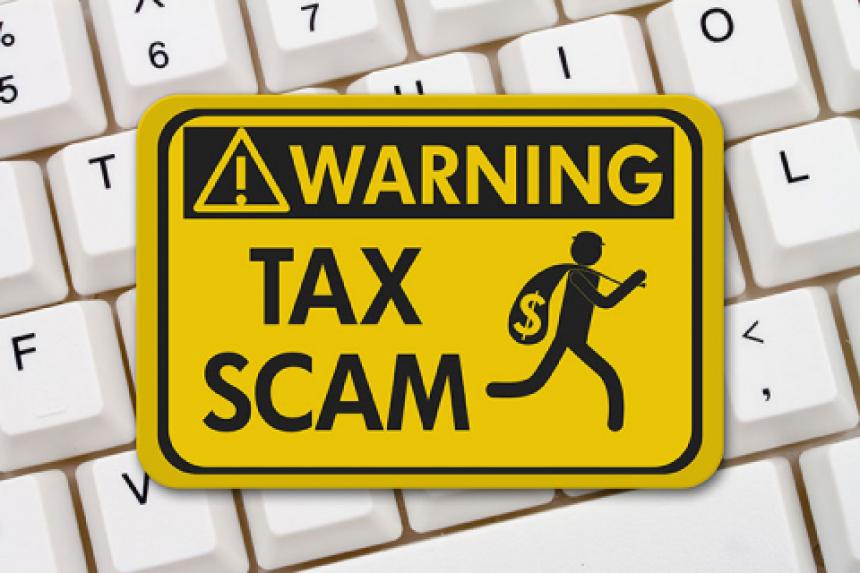
With tax season upon us, many Americans are getting their finances in order to file their tax return. At the same time, fraudsters are using scams designed to trick unsuspecting taxpayers. Fortunately, you can better avoid being a victim of tax scams when you understand what to look for and then take the appropriate action.
According to the Internal Revenue Service (IRS), there are two common tax scams to be aware of in the U.S. this tax season.
Scam #1: Email phishing scams
Phishing occurs when a criminal claiming to be from the IRS sends you an email addressing any of the following:
- You owe money on your taxes and can pay by clicking to a linked website. And, if you don’t pay, you’ll be arrested, deported, have your license revoked, or some other threat.
- You can quickly and easily receive your tax refund by clicking to a linked website.
- Your bank account or credit card has been compromised during the tax process, but if you click on the link provided, the IRS will help you update your information and resolve your problem.
The phishing email may contain links to websites that appear to be legitimate sites, but they are not. They are designed to ask unsuspecting taxpayers to share personal information that will then be used illegally. Other phishing emails may contain attachments which are used to damage or breach the security on your computer or digital device and potentially collect personal information.
What should you do?
The IRS will never initiate contact with taxpayers by email to request personal or financial information. In fact, most IRS contact is delivered through regular or certified U.S. mail. If you receive an email claiming to be from the IRS, you should:
- Report the email immediately by forwarding it to the IRS at: phishing@irs.gov
- Do NOT open any attachments.
Additionally, the IRS will never discuss tax issues with you through text messages or social media. If you receive notification in this manner, forward it immediately to phishing@irs.gov.
Scam #2: Phone scams
IRS phone scams continue to be a prevalent threat to the privacy and security of a taxpayer’s personal information. These scammers call you and claim to be an IRS agent. They then demand payment for taxes over the phone using your bank account or credit card information. Or, they will encourage you to quickly access your tax refund by providing personal or account information over the phone. Here are a few important things to remember:
- The IRS will never threaten you with deportation, arrest, or some other permanent penalty if you do not pay your taxes over the phone immediately.
- The IRS will never call and leave a pre-recorded message threatening you with law enforcement action if you don’t return the call.
- The IRS will never demand that you pay taxes without giving you the opportunity to appeal the amount you owe.
- The IRS will never require you to pay taxes using a specific payment method like a prepaid debit card.
The IRS may call you if you have a delinquent tax payment; however, the agent will reference a letter (with your case number) mailed to you through the U.S. postal service from the IRS.
What should you do?
If you receive a call and you owe a tax payment, report the call to the IRS immediately at 1-800-829-1040 to ensure there are no issues with your tax status. If you do not owe a tax payment, report the call immediately to the Treasury Inspector General for Tax Administration (TIGTA) at 1-800-366-4484 or at www.tigta.gov.
Protect yourself
Here are some simple strategies the IRS suggests to help protect yourself against tax scams:
- File your taxes early. That way, if a criminal tries to use your Social Security number to file a false tax return (and claim your refund), your return will already be filed. And, it’s also best to file electronically when possible. If you believe you’ve been a victim of identity theft, contact the IRS Identity Protection Specialized Unit at 1-800-908-4490.
- Secure your tax information. Keep your tax records in a secure location - preferably locked in a file cabinet or digital file. Don’t carry your Social Security card in your wallet, and never leave personal or sensitive information lying around your home or office.
- Update your software. Take the steps necessary to update the anti-virus and anti-malware software on your computer or other devices.
- Use a qualified tax preparer. If you choose to use a tax expert to help file your taxes this year, be sure he or she has the appropriate qualifications to assist you. Ask a trusted friend, family member or colleague for CPA referrals. Then be sure you’re comfortable and confident with your choice. Remember, you’re ultimately responsible for your tax return.
To learn more about other potential tax scams reported by the IRS, click here. The more you know, the more you can arm yourself against scams this tax season.
© BancorpSouth 2019

